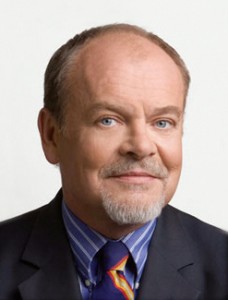Jennifer Waits and I are at the What is Radio conference in Portland, which opened with an interesting lecture by veteran radio/TV journalist Charles Jaco. It focused on the importance of narrative and storytelling in radio, and its decline on the commercial radio dial.
Jaco noted that it is in the public radio sector that one gets the best storytelling these days—on This American Life, the Moth Radio Hour, and similar shows listened to by predominantly upper-middle class audiences.
Why the decline in the commercial sector? The emphasis on profits plays a factor, Jaco noted. Commercial outfits “are interested in running the stations as cheaply as possible and selling the advertising time for as much as they can get, period, discussion is over,” he observed.
But, “how in the name of heaven did compelling storytelling on radio become the province of the upper level five percent educationally?” Jaco asked out loud. “If storytelling is among the oldest of human occupations and desires, why is it that the vast majority of Americans get almost none of it on their radio dials?”
Here was his answer:
“Let’s face it. For most people in this country life is already hard enough without asking them to think or feel while listening to the radio. And that may sound like a smart ass ironic comment, but it is absolutely the truth. Life is so distressingly hard for the majority of our fellow citizens these days, media, in whatever form, works best when it has an anesthetic effect, because life sucks, and they don’t want to be reminded of life when they turn on the radio or are watching the tube.”
I asked Jaco about this observation in the question and discussion period. Given that storytelling has survived and even flourished through many eras when life sucked, I noted, when did this relationship begin to wane?
Here was his reply:
“I think it has happened within the last 40 or 50 years. A number of things have happened. One is that the source for a lot of this storytelling, the nuclear family, has largely been blown to shreds in a lot of places, so kids don’t hear it. Secondly, how many people do you know, and I’m not talking about your peers, I mean in total, whose main baby sitter is The Tube? You sit the kid down in front and walk away from him.
How many people lost most of the value of their homes during the crash? How many people’s 401ks vanished? How many people’s jobs vanished? Well, 80,000 of them in the town I come from. St. Louis was gutted by the recession. Poverty makes people mean. Poverty pisses people off. People’s middle class expectations are being blown completely to hell. Do not make them yearn for something bright and shiny and wonderful. It makes them pissed off.
And for most of the people I talk to, media is their anesthetic. ‘Wow. I don’t have a job. The kid is still living at home. My husband has been laid off. Do I really want to think when I am listening to the radio? Do I really want to watch something on television that is going to engage me and get me outside of myself? No I do not’.”
The country has had a “collision of economic and social forces within the last half century or so that have accelerated within the last five or six years,” Jaco concluded. “So right now I think people who are engaged by media are the people who have the economic freedom to be engaged by media.”
A pretty stark analysis. Not sure I agree, but the speech was a heck of a way to start the conference. Paper presentations begin on Friday.



